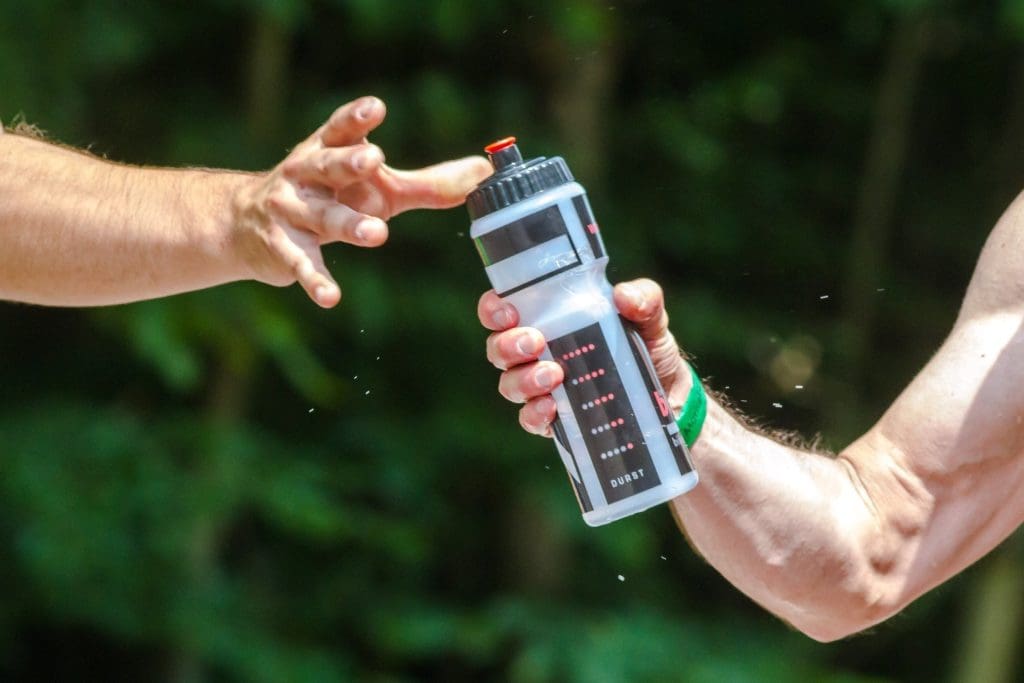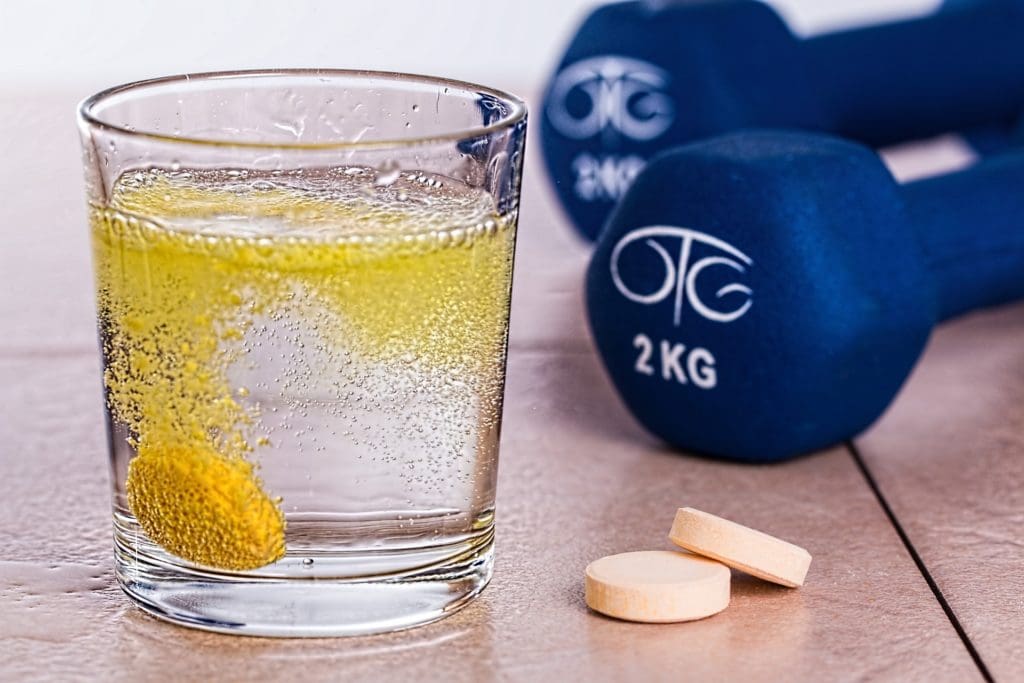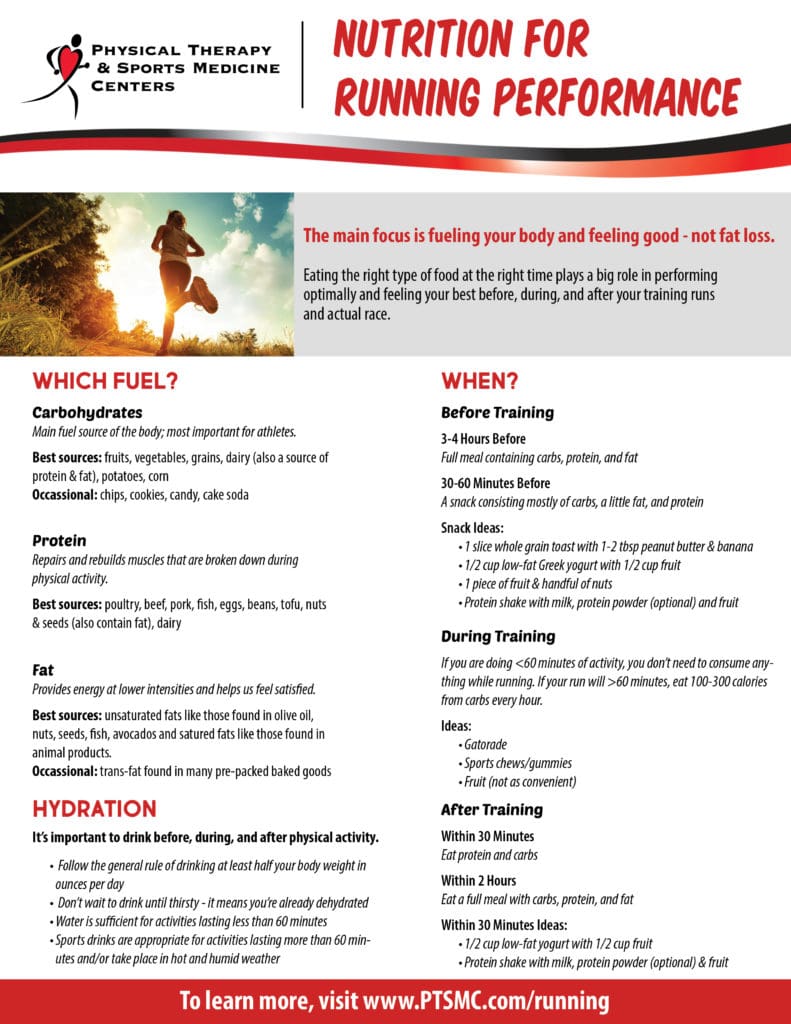Nutrition for Running – What to Eat and When to Maximize Your Training
When training for a race or marathon, most people focus their efforts on muscle and cardio strength and endurance, which can help runners go longer distances at a faster pace – but it’s just as important to focus on nutrition!

Having proper nutrition, eating the right foods at the right time, can make a big difference in training and give you the energy you need to smash through your goals.
While “proper nutrition” varies from person-to-person, there are some basic, scientifically proven concepts that most people should incorporate into their training.
Macronutrients
To start, food is broken down into three categories called macronutrients (or macros for short): these are carbohydrates, proteins, and fats. Don’t be scared of the words carbohydrates and fat – your body needs all THREE macronutrients to function correctly.
Carbohydrates
Carbohydrates are the main energy source for the body. There are so many different types of carbs and each one fuels our body different. Simple carbohydrates are easy and quick for your body to break down. These are usually found in processed foods but are also found in fruit, and are often high in sugar. There are also complex carbohydrates which take our bodies longer to break down, including starches, grains, rice, pasta, bread, and starchy vegetables. These complex carbs are often high in fiber, and because they take a while for our bodies to break down they are better sources of fuel for training, as they can provide energy for longer periods of time and can make you feel fuller. It’s important to note that processed carbs like white bread, white pasta, and white rice have also been stripped of some nutrients and act like simple carbohydrates.
Protein
Most people associate protein with body builders, but it’s important for everyone to eat enough protein, especially runners. Protein helps our bodies grow, build, and repair tissues and protect lean body mass. There are many sources of protein, such as meat, poultry, fish, egg, milk, cheese, and other plant protein sources like soy, beans, lentil, nuts, and much more.
Fat
It seems like every day another low-fat or no-fat diet product is released into the grocery stores, which can make you think you should be avoiding fat altogether – but that is far from the case! Fat helps you to store energy, make certain hormones, absorb fat soluble vitamins, and helps with cell membrane integrity.
Like carbs, there are different types of fat that interact with your body in different ways:
- Saturated Fat – large amounts of saturated fat have been known to increase cholesterol levels and increase risk of heart disease. The American Heart Association recommends 5-6% of your daily kcals come from saturated fat. Saturated fat is typically found in: fatty beef, lamb, pork, poultry with skin, lard, cream, butter, full fat cheese, and dairy.
- Unsaturated Fat – These are healthier fats that can decrease your risk of heart disease. You want to mainly eat unsaturated fats. Unsaturated fat is found in: avocados, nuts, seeds, olives, oils, salmon, mackerel, sardines, tuna and herring.
- Trans Fat – Trans Fat is most typically found in highly processed foods like junk food. These fats should be avoided as much as possible, as they lower “good” cholesterol and raise “bad” LDL cholesterol, increasing the risk of things like heart disease, stroke and diabetes. Certainly not the type of fat you want to be consuming for race training! Trans fat is typically found in: margarine, shortening, baked goods, doughs, fried foods, frozen foods.
When to eat certain macronutrients

Everyone needs all three macronutrients to function, but runners can benefit from eating certain macronutrients at certain times.
Before Training
Ideally 3-4 hours before training, runners should eat a full meal containing carbs, protein, and fat.
Examples:
- One medium-sized bagel with two slices of deli turkey with grapes
- Oatmeal with peanut butter and berries
If you’re unable to get a full meal in 3-4 hours before your run, you’ll want to eat a snack 30-60 minutes before. This is common for early-morning runners. The snack should consist of mostly carbs with a little fat and protein.
Examples:
- 1 slice whole grain toast with 1-2 tbsp peanut butter and banana
- ½ cup of low-fat Greek yogurt with ½ cup of fruit
- 1 piece of fruit and a handful of nuts
- Protein shake with milk, fruit, and protein powder (optional)
Foods to avoid:
Before running, it’s important to avoid foods that might upset your stomach. This includes food you don’t usually eat, so you want to make sure this is something you eat on a semi-regular basis. For example, don’t eat a bagel if you haven’t had one in more than a year. Other foods that can upset your stomach are high-fat foods like creams or foods with a lot of butter or oil, as well as high-fiber foods like beans and cruciferous vegetables.
During Training
If you are running or training for less than 60 minutes, you don’t need to consume anything while running. If your run will be over 60 minutes, you should try to consume 100-300 calories from carbs every hour.
Examples:
- Gatorade
- Sports chews, gummies
- Granola bars
- Fruit (not as convenient)
After Training
Your muscles will be sore and your energy stores will be depleted, so it’s important to focus on recovery. Within 30 minutes, you should eat carbs (to restock glycogen) and protein (to repair muscles).
Examples:
- ½ cup low-fat yogurt with ½ cup fruit
- Protein shake with milk, fruit, and protein powder (optional)
Within two hours, you should eat a full meal with carbs, protein, and fat similar to your meal 3-4 hours prior to training.
Hydration

Hydration is also extremely important, as training can cause dehydration, especially in hot and humid climates.
It’s important to drink before, during, and after physical activity. A good rule of thumb is to drink at least half your body weight in ounces of water per day. That means if you weigh 150 pounds, you should try to drink 75 ounces a day. One glass, depending on the size, is usually about 8 ounces. We also get water from our foods, but it’s not enough and varies based on what we eat.
It’s also important not to wait to drink until you’re thirsty – if you feel thirsty, that means you’re already dehydrated! Drinking consistently throughout the day makes sure that you’re properly hydrated. It is possible to OVER hydrate, but it’s very rare. According to CBS in 2013, up to 75% of Americans suffer from chronic dehydration.
If you’re training for less than 60 minutes, water should be sufficient. If you’re training for more than 60 minutes and/or you’re training in hot and humid weather, you should opt for a sport drinks like Gatorade or coconut water, which will replenish your electrolytes.
Supplements

Supplements, including vitamins, minerals, and protein powders, can be beneficial to give your nutrition an extra boost. Protein powder in particular is a convenient way to get your protein in pre– or post-race.
While there are no calories in vitamins or minerals, and they’re not a direct source of energy – meaning they’re no food replacement – they can help unlock the calories in food to be used for energy.
Healthy eating habits usually provide sufficient vitamins and minerals, but supplements may be necessary for some. The most important are sodium and electrolytes, Iron, Calcium, and B vitamins.
Of course, everybody’s needs are different depending on a whole host of factors, including genetics, weight, environment, intensity of training, etc. These are some general nutrition tips for runners that can help you feel energized and strong during training or on race day.
Downloadable PDF – Nutrition for Running

